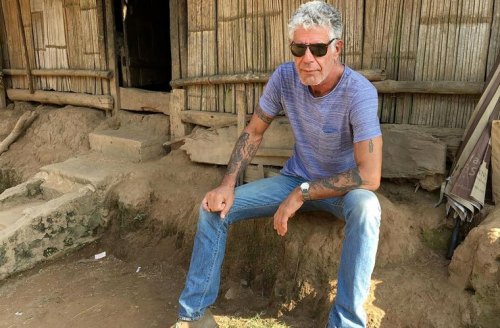Our editors independently select these products. Making a purchase through our links may earn Well+Good a commission
Anthony Bourdain was a wellness hero to me
The beloved chef was a loud critic of "health food," but it was his love—and discernment—that inspired me. And whether he knew it or not, his approach was Ayurveda-approved.

No one would have ever accused Anthony Bourdain of being a “healthy chef.” In fact, he famously said, “Being vegan is a first-world phenomenon, completely self-indulgent”—and if you ever saw one of his globe-trotting shows you’ve probably seen him enjoying everything from foie gras to tuna belly. And butter, so much butter.
And yet. When I think of my evolution from a clueless Diet Coke-guzzling teen to an adult who thinks way too deeply about the mold content of the coffee beans that make up my daily cup, the beloved chef (who also happened to be one of the best storytellers of the past 20 years) played a huge part.
Because it was Bourdain, who died today at age 61, who famously deconstructed brunch in the 2000 book that made him a star, Kitchen Confidential. (Short version: You’ll never trust the freshness of a Hollandaise sauce again.) And this, as much as anything else, put me on a path that led straight to the farmers market. A passion for ingredients, sourcing, freshness, how things are made: It all started, weirdly, from looking at my brunch plate and realizing that the “specials” are all things they have too much of, as Bourdain warned.
When I think of my evolution from a clueless Diet Coke-guzzling teen to an adult who thinks way too deeply about the mold content of the coffee beans that make up my daily cup, the beloved chef played a huge part.
And so a health and wellness editor was (eventually) born—something Bourdain would have hated. Which makes me love him more. God, who didn’t love his crankiness? I’ll take the company of a million Anthony Bourdains who laugh at a quinoa-and-veg order over anyone who says “food is just fuel” on a regular basis. For Bourdain, meals weren’t abstract things with numbers stamped on them (tabulating fat, calories, sugar, and fiber). He viewed food and the sacredness of meal time with a deep appreciation of sensations, of pleasure—and of being alive. That’s why his death from suicide is so incomprehensible.
I don’t know if Bourdain ever learned anything about Ayurveda during his travels as the host of the Travel Channel’s No Reservations and most recently CNN’s Parts Unknown, but his discernment about food fit right in with the traditional system of medicine from India: He did not snack. Especially in his later years, he exercised a lot (Brazilian jiu-jitsu, specifically). He only ate fresh food, prepared with care: “Bad food is made without pride, by cooks who have no pride, and no love,” he once told an interviewer. And he understood that pleasure was important—and according to Ayurveda, enjoying the food improves your digestion, which improves your absorption of the nutrients in the food you’re eating.
He viewed food and the sacredness of meal time with a deep appreciation of sensations, of pleasure—and of being alive.
I remember in one episode of No Reservations, he traveled to Sicily. He was part of a huge family meal, sitting outside at an oversized table, heavy with plates of summer vegetables and seafood. It was a sun-dappled scene in late afternoon: Children, including his young daughter, ran around the table, which was framed with hanging plants and lush flowers blooming everywhere. He was eating. He was beaming. He was alive. How he got from that moment to this one, it seems impossible to imagine. But that’s how I’ll remember him.
Talking about suicide is never easy, but it could be life-saving. Here, a psychiatrist explains why. And here are expert-approved tips for helping a loved one who is dealing with depression.










